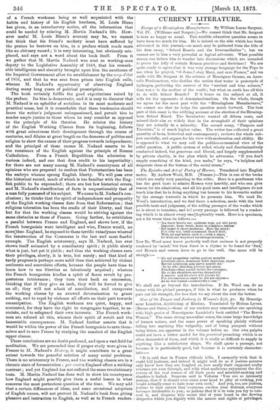The Epistles and Art of Poetry of Horace. Translated into
English metre. By Andrew Wood, M.D. (Nimmo.)—This is one of the books which are really very puzzling to the critic. Here is a gentleman who has the good taste to admire Horace very heartily, and who can give reason for his admiration, and all his good taste and intelligence do not teach him that he is doing anything but honour to his favourite author by the strange travestie in which he presents him. We read Dr. Wood's introduction, and we find there a selection, made with the best possible taste and judgment, of the telling passages of the works which he is about to translate, and lo! every passage is followed by a render- ing which is in almost every ease deplorably weak. Here is a specimen, not a bit worse than its fellows :— Ira furor brevis est: animum rage, qui nisi paret Imperat ; hunc frenis, hunc to compesce oaten`.' 'But anger is short madness. Rule thy mind: If it obey not, 'twill command, thou It find; With bit and bridle curb it,—with a chain Its wild and wayward curvetings restrain.' " Now Dr. Wood must know perfectly well that animum is not properly rendered by ' mind,' but then there is a rhyme to be found for 'find,' and Horace and reason have to go to the wall. One more will be
enough:—
"'Sic qui pauperism veritna potters metallis Libertate caret, domiuum vehit improbus, atque Serviet aeternum quia parvo neeciet ati;' 'So he who dreading poverty aye pines, ♦ Freedom—than metals better far—resigns ; He ou his shoulders carries shamefully A master, and his slave will always be, For circumstances small he did not choose— As he was bound—contentedly to use.'" We shall not go beyond the introduction. If Dr. Wood can do no better with his picked passages, if this is what ho produces when he puts out his strength, the less that we say about the rest the better.






































 Previous page
Previous page